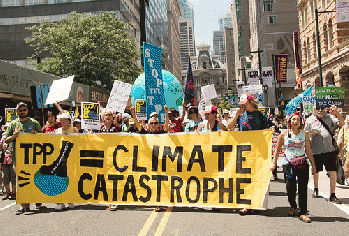Reprinted from www.yesmagazine.org by Sarah van Gelder
It took two days for 60 members of the Cowboy and Indian Alliance to plant the heirloom seeds by hand. It was the spring of 2014, and there were prayers, burning of sage and sweetgrass, and, one by one, volunteers pressed the red corn seeds into the earth of Art and Helen Tanderup's farm in Neligh, Nebraska. There, along the Ponca Trail of Tears, the Ponca people in 1877 were forced to leave their homeland after planting their corn seeds, many dying along the way or starving when they arrived in Oklahoma. But the sacred red seeds were being planted again in Nebraska for the first time in more than 100 years.
The planting had another meaning too: It took place along the path of the proposed Keystone XL Pipeline, a project opposed by the Cowboy and Indian Alliance and many others along its path. And the water used to irrigate the seedlings came from the source of water for much of the Great Plains--the Ogallala Aquifer--which is threatened by potential pipeline ruptures, fires, spills, and other mishaps.
This aquifer and, indeed, this land are shared by millions, so who is to say what should happen to them? Should they be used to grow corn and feed people? Should they be part of reestablishing indigenous ways of life and rural livelihoods? Or should they be put at risk by tar sands pipelines?
These sorts of questions come up over and over again as local residents, in cities, towns, and on farms, rise up to oppose dangerous and polluting fossil fuel projects. All too often, they find the federal government taking the side of the oil, coal, or gas industry. That will happen even more if President Obama is able to push the TransPacific Partnership (TPP) through Congress, which he hopes to do during the lame-duck session following the November election.
What does the TPP have to do with pipelines? After being negotiated in secret, the substance of the agreement finally became public. As many had feared, the TPP, like NAFTA, contains a controversial provision that allows foreign corporations to sue governments when regulations or permitting decisions deprive the company of profits.
At a time of growing inequality, we don't need to make it easier to outsource jobs.
Take the case of the Keystone XL Pipeline, which Obama refused to permit as a result of local action--like the corn planting--and a powerful national movement led by 350.org. TransCanada, the company behind the pipeline, is suing the United States for $15 billion in losses under NAFTA. A three-judge panel will soon rule on whether to penalize U.S. taxpayers for preventing this giant corporation, armed with the power of eminent domain, from running its pipeline through ranches and farms.
Passage of the TPP would further tip the balance of power in favor of these transnational corporations at the expense of community self-determination. Corporations from the signatory countries could insist on building or mining on American soil, and sue if local, state, or federal regulations interfere.
A year ago, passage of this controversial trade pact seemed inevitable, but popular disgust with the deal helped fuel the insurgent candidacy of Bernie Sanders and Donald Trump, and convinced Hillary Clinton to come out in opposition to the trade deal.
So will the TPP get approved, and should it?
My view is that corporations already have too much power. At a time of climate change emergency, we don't need to make it easier for transnational corporations to roll over the objections of communities everywhere with their new fossil fuel projects. At a time of growing inequality, we don't need to make it easier to outsource jobs. At a time of widespread corruption of governments by powerful moneyed interests, we don't need to give mega-corporations yet another tool to override the will of "we the people."
Instead, our hope lies in shifting power to communities and regions--urban and rural--that prioritize safety, clean air, children's health, and locally rooted livelihoods. The benefits might be invisible to economists and policy makers, because they can't all be measured in profits and dollars. But human well-being and ecological resilience are what matter, whether in the streets of our cities and towns or in Nebraska's abundant harvest of heirloom red corn.





